Basic Cardiac Life Support
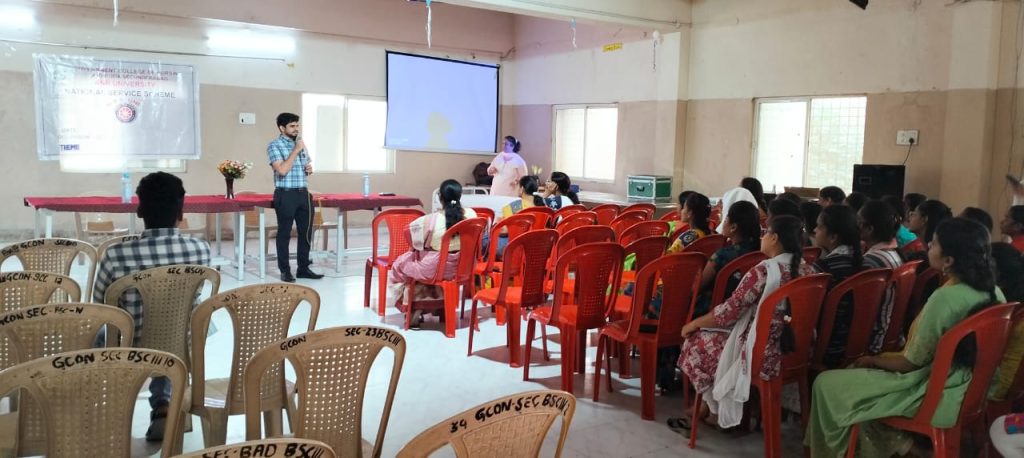
Basic Cardiac Life Support The Department of Emergency Medicine, NIMS was invited to teach Basic Cardiac Life Support to Staff nurses and nursing students of Government Nursing college, Secunderabad on 19.02.2024. The financial support to procure certificates for nurses was aided by Association of Emergency Medicine Educators. AEME has a sole mission of training Healthcare professionals BCLS and CCLS ( The Basic and Comprehensive cardiac life supports advocated by Indian Resuscitation Council Federation). The training of Compression Only Life Support ( COLS) was given to college technical staff .
MRCEM IINTERMEDIIATE WORKSHOP
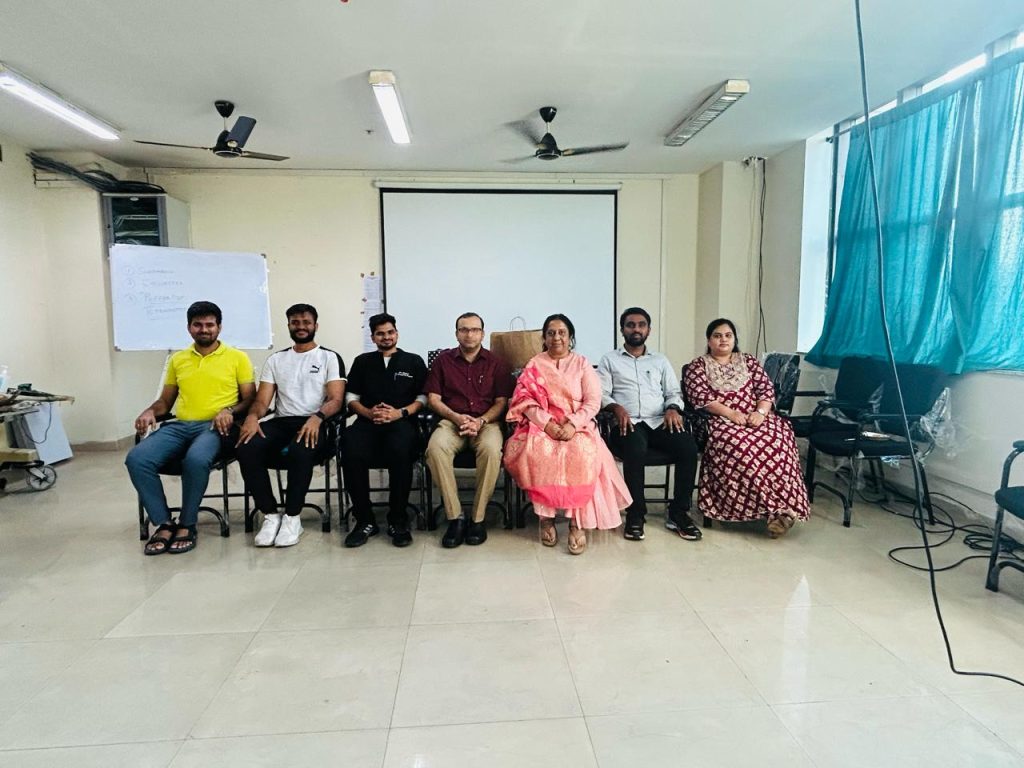
Salient features for MRCEM intermediate • Comprehensive Course Based On The New Rcem Curriculum Delivered By A Reputed And Experienced Team Of EM Experts.• In Depth Review Of The Entire Curriculum Mapped To Each Of The SLO’s (Specialty Learning Outcomes).• Strategies To Handle Challenging Questions With Focus On High Yield Topics• Dedicated Practice Papers Under Strict Exam Conditions Followed By A Detailed Discussion And Explanation Of Answers• Unique Opportunity To Practice From A Extensive Question Bank Of Single Best Answers (SBA) Over The 3 Full Days.• Dedicated Post Course Support And Online Sessions To Reinforce
CPD on “EVIDENCE BASED EMERGENCY MEDICINE PRACTICE”
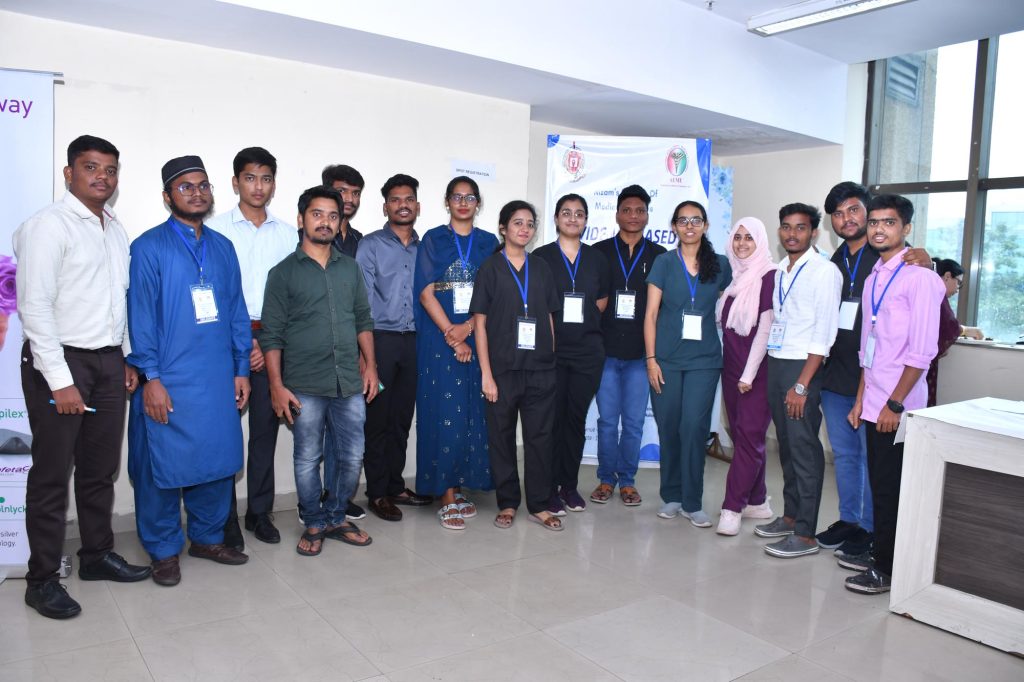
A Continuing Professional Development (CPD) session on Evidence Based Management of emergencies was conducted on 17 September 2023 by the Department of Emergency Medicine. The programme was organised under the leadership and guidance of Organising Chairperson Dr Ashima Sharma, Professor and HOD, Department of Emergency Medicine. Many eminent faculties and students of Emergency Medicine attended the wonderful sessions based on the evidence-based updates in the management of various surgical and medical emergencies. The first session of the day started with Dr. Arun, Senior Consultant and HOD, Emergency Medicine, Continental Hospital, Hyderabad, who talked extensively about ischemic chest pain in the emergency department, with highlights on the latest AHA guidelines for the same. View Video The second talk was by Dr. Vishwesh, senior consultant and HOD in the Department of Emergency Medicine, who talked about the basics of mechanical ventilation in emergencies. View Video The next session was by Dr. Ratna, HOD, Emergency Medicine at AIG Hospital, who talked about “Stroke beyond Window Period.” View Video Session on Right Heart Failure by Dr. Aravind, Senior Resident in the Department of Emergency Medicine, NIMS, in which the use of POCUS to detect acute RV dysfunction and treatment of right heart failure and the use of various treatment options like inhaled nitroglycerin were talked about. Discussions on the dangers of intubation in right heart failure and the initiation of newer studies were discussed. View Video Dr. Mubashir Ahmed, Senior Resident in the Department of Emergency Medicine, NIMS, talked about the urgent care needed in the ED in the management of DKA—which fluid is needed, how much fluid is needed, the electrolyte management, and the complications associated with DKA that are expected during DKA management in the ED. View Video Next was an interesting topic on complicated snakebite presented to the ED by Dr. Najeebuddin, Senior Resident, Department of Emergency Medicine, NIMS. Talks and discussions about the varied presentations of snake bites, initial prehospital management of snakebite, early treatment options, and early detection of complications associated with snakebite were discussed. View Video The next session was by Dr. Sravan, Senior Resident, Department of Emergency Medicine. Being a General Medicine Postgraduate, he was able to shed light on the different presentations of Chronic Liver Disease to the emergency department. This was followed by virtual case presentations by post graduate students of Emergency Medicine throughout the country. View Video
POCUS PRACTICE

Welcome to to Point-of-Care Ultrasound (POCUS) Workshop NIMSEMD 2023 ! This workshop is designed to provide participants with a foundational understanding of Point-of-Care Ultrasound, a valuable medical imaging technique that has gained significant popularity in recent years. POCUS allows medical professionals to gather real-time visual information at the bedside, aiding in quick and informed clinical decisions. By the end of this workshop, you’ll have a solid understanding of the principles of Point-of-Care Ultrasound and its practical applications in the medical field. Whether you’re a physician, nurse, paramedic, or allied healthcare professional, the knowledge and skills gained from this workshop will enable you to confidently incorporate POCUS into your clinical practice, ultimately enhancing patientcare and outcomes. Get ready to embark on an exciting journey into the world of Point-of-Care Ultrasound!
International First Aid Day
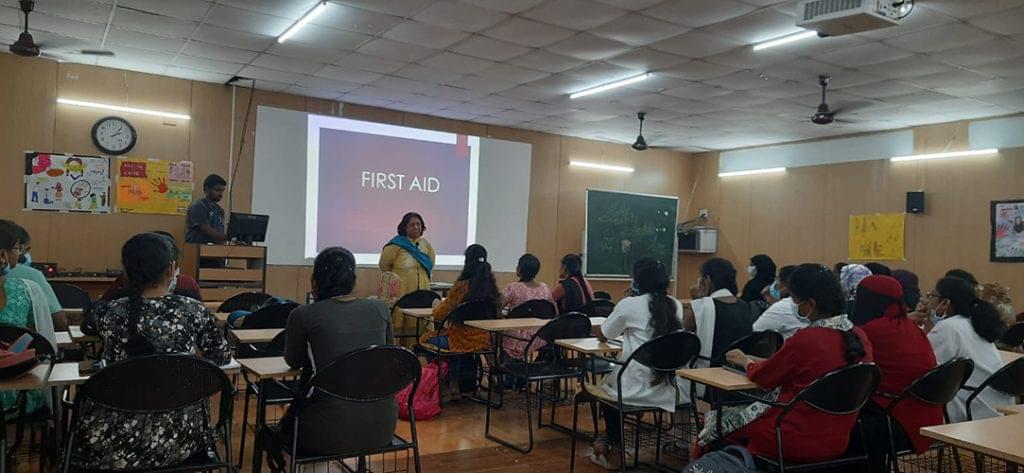
International First Aid Day serves as a poignant reminder of the pivotal role that immediate assistance plays in saving lives during emergencies. Observed globally on the second Saturday of September, this day underscores the significance of being the “first line of hope and help.” First aid knowledge empowers individuals to respond swiftly and effectively to injuries or sudden illnesses, bridging the crucial gap between the occurrence of an incident and the arrival of professional medical assistance. It highlights the importance of cultivating a society where everyone is equipped with the skills to provide basic medical care, fostering a community of caregivers ready to act in times of need. On this day, communities, organizations, and individuals come together to raise awareness, share knowledge, and celebrate the unsung heroes who serve as the initial lifeline in times of crisis. International First Aid Day is a call to action, urging people to be proactive contributors to the well-being of their communities, thereby reinforcing the notion that everyone can make a difference when it matters most. Download PDF
OPTIMIZING SEPSIS CARE IN EMERGENCY MEDICINE
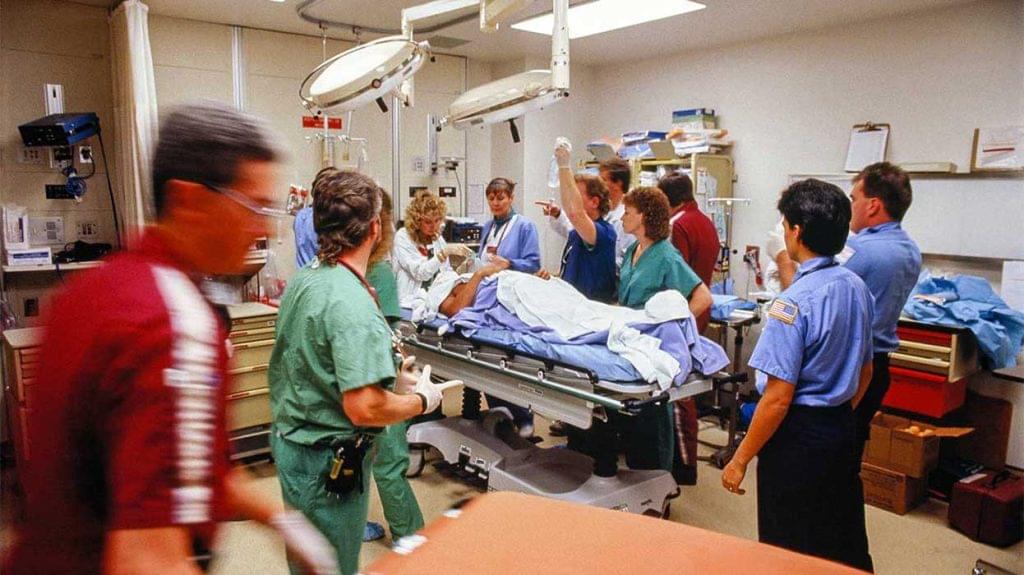
Sepsis, often referred to as the silent killer, represents one of the most pressing challenges faced by emergency medical professionals worldwide. It is a condition that knows no boundaries, striking both the young and old, the previously healthy and the chronically ill. Our collective goal is to illuminate the path forward, to bridge the gap between evidencebased medicine and real-world practice, and to provide a platform for open discourse and shared experiences. Together, we aim to empower healthcare professionals with the knowledge, tools, and insights needed to deliver the highest standard of care to sepsis patients who entrust us with their lives. National Faculties Dr. Ashima Sharma Prof & HOD EMD ( NIMS Hyderabad) Dr. Bhavesh Jarwani Prof & HOD EMD (NHL Municipal Medical College Gujarat) Dr. Chandni Sajeevan HOD EMD (Government Medical College- Kozhikode Kerala) Dr. C R K Prasad Prof & HOD EMD (AIMSR Hyderabad) Dr. Harsha Makwana Prof & HOD EMD (LG hospital Narendra Modi Medical college Ahmedabad Gujarat Dr. Mehul Gujjar Assoc. Prof EMD (LG hospital Narendra Modi Medical college Ahmedabad Gujarat) Dr. Nidhi Kaeley Head EMD (AIIMS Rishikesh) Dr. Rashmi Sharma Prof & HOD EMD (SMS&R Sharda University GreaterNoida Dr. S. Prakash Babu Assoc. Prof EMD (St. Peters Medical College Hospital & Ri, Hasur, Tamiinadu) Dr. Varsha Shinde Prof & HOD EMD (DY Patil Medical College Pune) Dr. Varun Byrappa Assoc. Prof & HOD EMD (KIMS, Bengaluru) International Faculties Dr. Arunachalam Einstein MD, FACEP, FAAEM, Seattle, USA Dr. Venkat Kotam Raju FRCEM, MRCS, MdAcadMED, (Royal Derby Hospital UK) View and Download the PDF Download PDF
ZERO SNAKE BITE DEATHS :: IMPOSSIBLE TO POSSIBLE.

India is World’s ‘Snakebite Capital’ with 2.8 million bites a year with 35,000–50,000 people dying per year according to World Health Organization (WHO) [1,2]. Lack of a coordinated comprehensive care in snake bite management is the key factor of highest numbers of deaths and morbidity in India.India and our state, Assam too lacks comprehensive care model in snake bite management.However we ,Assam has no robust data about snake bite related deaths. We received phone calls from Digboi on 11/06/2022,patient was bitten by a snake ,they went to faith healer/tantra and mantra and died.They did not reported hospital.How many deaths are happening like this without notification to health centre,we donot have data. There is no LINK between snake bite and hospital care.Therefore we tried our best to create and sustain this link. Till 11th June of 2022,we have received reports of 3 deaths from various parts of Assam. Two were from Digboi and one was from Dhuburi.Unfortunately all these deaths could have been prevented if both public and health care workers were aware of venomous snake bite symptoms. For successful care of snake bite victims,we have to formulate comprehensive care to such victims,so that they shouldnot dissatisfied from our care.We also have to remember that snake bite is a poor men’s acute emergency.Therefore,we must try our best not to give economic burden to these poor patients in this snake bite crisis time. Therefore Comprehensive care is a planned coordinated preventive,promotive,curative,mental & socioeconomic care to snake bite victims. India lacks the coordinated movement of snake bite victims from field to hospital.Demow Model hospital cum CHC,tried their best to provide Comprehensive care to these victims since 2018. Why India need comprehensive care? 1.Lack of awareness amongst public. 2.Majority attended faith healers [3,4]. 3.Poorly trained health care workers (HCW) in rural districts [5,6]. Fear of HCW to administer ASV (Anti snake Venom). 4.Poor transportation system to hospital. 5.Delayed ASV administration [7,8] 6.Nonavailability of ASV 7.No support to victim’s family due to huge financial burden [9], if treatment is prolonged. 8.No address to mental issues post snake bite [10] 9.It is not approached as acute emergency. 10.Myth that snake bite cases can be treated only in tertiary center. India and Assam have huge gaps from prehospital, point of source hospital, secondary care hospital to Government level. For effective treatment of snake bite victims, we should have an organized care system. Prehospital management: Venom Response Team (VRT) Prehospital management is greatly neglected in India due to lack of education of our society. After snake bite our public completely lost and often misleaded. We started to train and educate public since 2008(Fig A). A VRT can be constructed to guide snake bite victims in each gram panchayat level comprising gram Sevak, local organizations & ASHA workers. They can be trained so that they can activate, communicate HCW & can transfer victims safely to nearest hospital. It is the need of the hour. Our model focused to educate, empower, and train public. These trained/educated public are called VRT.We have done till now 150 numbers of community awareness programme in and around Demow and Sibsagar district.We have also collaborated with APADA MITRA project of central Government under District Disaster Managaemner Society(FigB).Our plan is to create train and educate health volunteers under APADA Mitra Project,which are now officially called VRT.We have formed a whats app group with Public of different communities along with trained APADA MITRA health volunteers.These VRT will notify us as well as safe and scientifically transfer snake bite victims to nearby hospital. Figure: A: Community Awareness programme Our effort towards comprehensive care in snake bite in Upper Assam It is true that public and society have to rush to hospital once there is any snake bite. If they don’t rush to hospital immediately, morbidity and mortality couldn’t be prevented at all. So, our model starts from public/society and ends in Hospital. Public awareness & Education is the key. How we did it? We have to take help of 3Ps.Public, Press & Politician. Now a days, digital platform is the best to reach out many within short span of time. We have to publish our own successful stories in our own local language in various digital formats. Facebook and what’s app are the most popular digital media in various nook and corners of India, we should post our success stories of venomous snake bite treatments with photographs and address of the victim (with their written informed consent) . Let public know that snake bite means hospital admission. Make them believe that there is a full proof medical management of venomous/nonvenomous snake bite in India. We have also participated in Television talk show and Radio talk show campaigning for hospital admission immediately after snake bite. We have formed a what’s app group with our trained and educated general public. The name of our group is SNAKE: Public awareness group. It works like VRT. Every small community should have such group. We are readily accessible, and we come to know any snake bite incident in our local area, who are immediately transferred to nearby hospital. On 29th September 2019, we have conducted a scientific CME(Continuing Medical Education) about snake bite with our local public and General Practitioners. We have trained general public along with doctors, paramedical staff & ASHA workers. Strengthening the health care system We have interviewed 100 victims of snake bite all over from Assam. We found all had full faith in local healers and they believed there is no medical treatment for snake bite. Few of them reached nearest hospital at the earliest but soon referred from one hospital to other and died in the ambulance itself. Many hospitals had ASV but did not administered by health care workers for possibilities of litigation and fear. Few had expired ASV, and many hospitals did not have the ASV at all. We have also witnessed nearby hospitals were 100-200 km apart and, in some places, transportation was also not feasible. We have to strengthen our rural primary (PHC)
